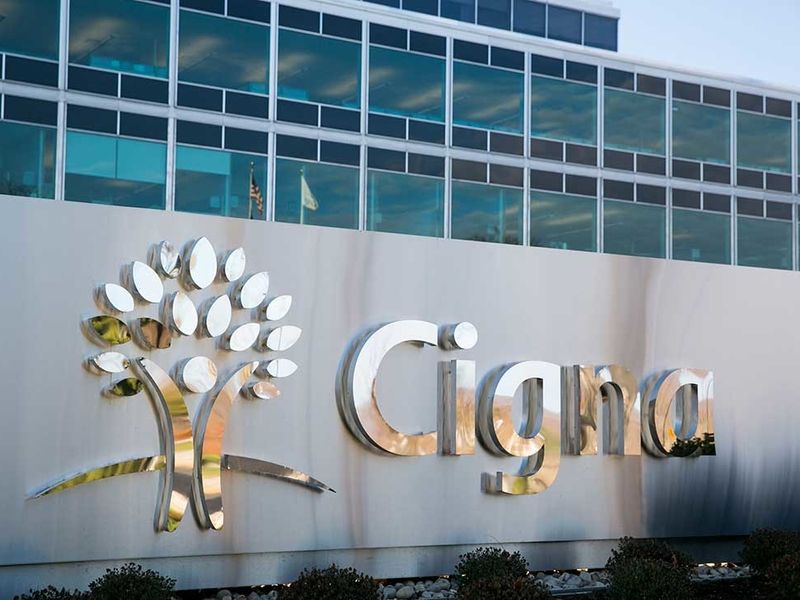
Three former Express Scripts executives announced their retirement from Cigna Corp. on Thursday, just in time to collect the full compensation owed to them under the terms of the merger agreement.
Evernorth CEO Tim Wentworth, who served as CEO of Express Scripts, and chief clinical officer Dr. Steve Miller, who served as vice president of Express Scripts, will retire from the Bloomfield, Connecticut-based insurer at the end of 2021. Matt Manders, president of government and solutions at Cigna, will also retire at the end of the year. Manders also joined the company during Cigna’s $67 billion acquisition of Express Scripts in December 2018.
Under the terms of the deal, Wentworth received an annual salary of $1.5 million, a target annual incentive award of up to 200% his base salary and an equity award opportunity of $6 million, according to a filing with the U.S. Securities and Exchange Commission. He also received deferred compensation of $8.25 million and a restricted stock award of $6 million, both of which vested over three years, the SEC filing said. The end of 2021 marks the deadline for Wentworth’s stock and equity awards to vest. The filing did not disclose Miller or Manders’ compensation packages.
Cigna did not respond to an interview request.
“As we look ahead to our next chapter, I’d like to recognize Tim, Matt and Steve for their visionary leadership,” Cigna CEO David Cordani said in a statement. “Three years ago, they each agreed to play a critical role leading our enterprise through the Cigna-Express Scripts combination. With the successful completion of our integration over one year ago, the launch of Evernorth and the significant growth of Evernorth and our U.S. government businesses, they are transitioning to our next generation of enterprise leaders.”
Executives may no longer have any incentive to stay at the insurer, although they probably will not settle into a quiet retirement, said Ari Gottlieb, a principal at the Chicago-based A2 Strategy Group. He said that Wentworth, Miller and Manders would likely go on to run private equity firms, launch startups or invest venture capital dollars.
“I think that if you go back to the Delaware judge’s decision last summer in the lawsuit between Anthem and Cigna, the judge made it very clear that the leadership of Cigna was very interested in maintaining control of their business and staying in charge,” Gottlieb said.
The Delaware Chancery Court ruled last August that neither Anthem or Cigna could collect damages from the failed $54 billion merger, which would have created the nation’s largest health insurer. The decision concluded a bitter, yearslong battle between the companies and their top executives, who called off the merger in 2017 after a federal court issued a permanent injunction against the deal.
Animosity between the two companies factored into U.S. District Judge Amy Berman Jackson’s decision to block the deal, who referred to the fractured relationship between Cordani and former Anthem CEO Joseph Swedish as “the elephant in the room.” The court eventually said that Cordani was not a credible witness, and pointed to his belief that Cigna should take control of the combined organization as a factor for driving a wedge between the merger.
Now, the company is focused on its next chapter.
Cigna has promoted Chief Operating Officer Eric Palmer to CEO of Evernorth, where he will succeed Wentworth. Palmer has worked at the company for 23 years, serving in a variety of executive roles, including as chief financial officer.
Cigna does not appear to be filling Miller’s role of chief clinical officer.
But the company has named Paul Sanford as executive vice president of operations, a newly-created role in charge of overseeing customer service operations, provider services and other operational aspects of the business.
Aparna Abburi, president of Medicare, and Lisa Lough, vice president of individual and family plans, will continue their leadership of the U.S. government business, succeeding Manders’ position, Cigna said.
Cigna also expanded Global Chief Information Officer Noelle Elder’s role to manage the company’s data, analytics and automation functions across the world. Everett Neville has also taken on an expanded leadership role as executive vice president of strategy, corporate development and solutions.
All of these moves point to investment in the company’s Evernorth division, the company’s health and pharmacy services business, said Rick Kes, a healthcare industry senior analyst at RSM. Evernorth is being developed as a platform other health plan and provider customers can use to digitize their businesses, similar to UnitedHealth Group’s Optum subsidiary, he said.
At the end of the company’s most recent second-quarter on August 5, Evernorth generated $32.5 billion in revenue, up 14% year-over-year, making it by far the most profitable sector of Cigna.
“They’re trying to take some of the things that maybe a smaller health plan wouldn’t be able to develop on their own and that would want to outsource it and make it easier for them to do that,” Kes said. “To maybe make a software as a solution or a service to be used by other health plans.”
Source link : https://www.modernhealthcare.com/people/cigna-invests-evernorth-after-express-scripts-executives-retire











